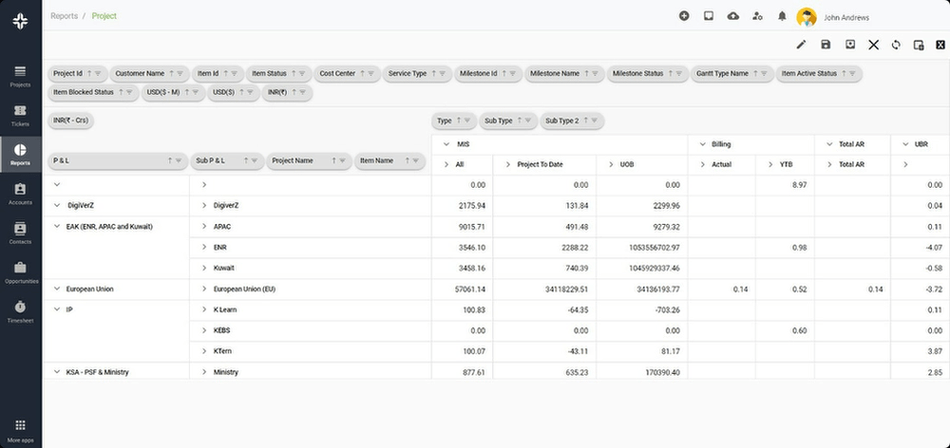Home » PSApedia
Project Overrun Cost
Gain Insights on Project Overrun Costs. Identify, Analyze, and Optimize to Ensure Successful Project Delivery.

What Is Project Overrun Cost?
Project Overrun Cost refers to the additional expenses incurred when a project surpasses its initially estimated budget or timeline within a Professional Services Automation (PSA) context. It represents the difference between the planned project costs and the actual expenses accrued due to delays, scope changes, or unforeseen circumstances.
In Professional Service Automation (PSA), Project Overrun Cost refers to the additional expenses incurred when a project exceeds its planned budget or timeline. It includes costs due to extended labor hours, additional resource utilization, and other unforeseen expenses.
Significance of Managing Project Overrun Costs
Project Overrun Cost Analysis is critical in PSA since it directly effects project profitability and success. It identifies inefficiencies, deviations from budgets, and areas for improvement in project management and execution.
1. Profitability Impact: Overrun costs can significantly reduce the profitability of projects.
2. Client Satisfaction: Excessive overruns can lead to client dissatisfaction and potentially harm business relationships.
3. Operational Efficiency: Managing overrun costs is crucial for maintaining operational efficiency and project management effectiveness.

Significance of Managing Project Overrun Costs
How to calculate Project Overrun Cost?
Project Overrun Cost is typically calculated by subtracting the original budgeted cost from the actual total cost upon project completion. It’s important to factor in all direct and indirect costs associated with the overrun.
The formula to calculate Project Overrun Cost involves comparing the planned cost with the actual cost:
Project Overrun Cost = Actual Project Cost − Planned Project Cost
- Actual Project Cost encompasses all expenses incurred throughout the project’s lifecycle, including materials, labor, and other overheads.
- Planned Project Cost refers to the initially estimated or budgeted cost for the project.
Example:
Suppose a project’s planned cost was estimated at $100,000, but due to unforeseen circumstances and changes, the actual cost incurred amounted to $120,000. Applying the formula:
Project Overrun Cost=120,000−100,000=20,000
Thus, the Project Overrun Cost for this project is $20,000.
Project Overrun Cost vs Similar Metrics
Compared to metrics like project variance or cost deviation, Project Overrun Cost specifically quantifies the additional expenses incurred beyond the planned budget. While project variance might indicate deviations from the estimated values, Project Overrun Cost precisely focuses on the excess costs due to project delays or scope changes.
Budget Deviations refer to any departures from the initial budget, whether over or under, while overrun costs specifically focus on expenses that exceed the planned budget.
| Metric | Definition | Importance / Use |
|---|---|---|
| Project Overrun Cost | Additional expenses beyond the initially budgeted cost | Indicates the extent of budget overshooting for a project |
| Cost Variance | Difference between budgeted and actual costs | Measures the variance between planned and actual project expenses |
| Time Overrun | Additional time taken beyond the planned project duration | Reflects the delay or extension in project completion beyond the schedule |
| Return on Investment (ROI) | Ratio of net profit generated to the cost of investment | Measures the efficiency and profitability of investments |
Utilization of Project Overrun Cost
Analyzing Project Overrun Cost assists businesses in assessing the efficacy of project management, identifying risk factors that lead to cost overruns, and implementing methods to avoid such risks in future projects. It enables proactive cost-cutting strategies and provides improved project planning and execution.
1. Accurate Project Planning: Using tools like project management software for realistic and thorough project planning.
2. Continuous Monitoring: Implementing real-time tracking and monitoring of project progress and expenditures.
3. Risk Management: Identifying potential risks early and planning contingencies to mitigate them.
Ready to Minimize Your Project Overrun Cost?
KEBS provides complete project management solutions that aid in tracking project costs, managing budgets, and mitigating project overruns. Businesses can proactively manage and control Project Overrun Costs with KEBS features for better project outcomes.
Utilizing KEBS tools for effective tracking of project milestones and budget usage. Employing KEBS reporting features for regular analysis and management of project financials. Optimizing resource allocation and utilization using KEBS resource management solutions.

KEBS Project Management
To understand how KEBS can assist in controlling project overrun costs and enhancing project profitability, contact us or request a demo.



